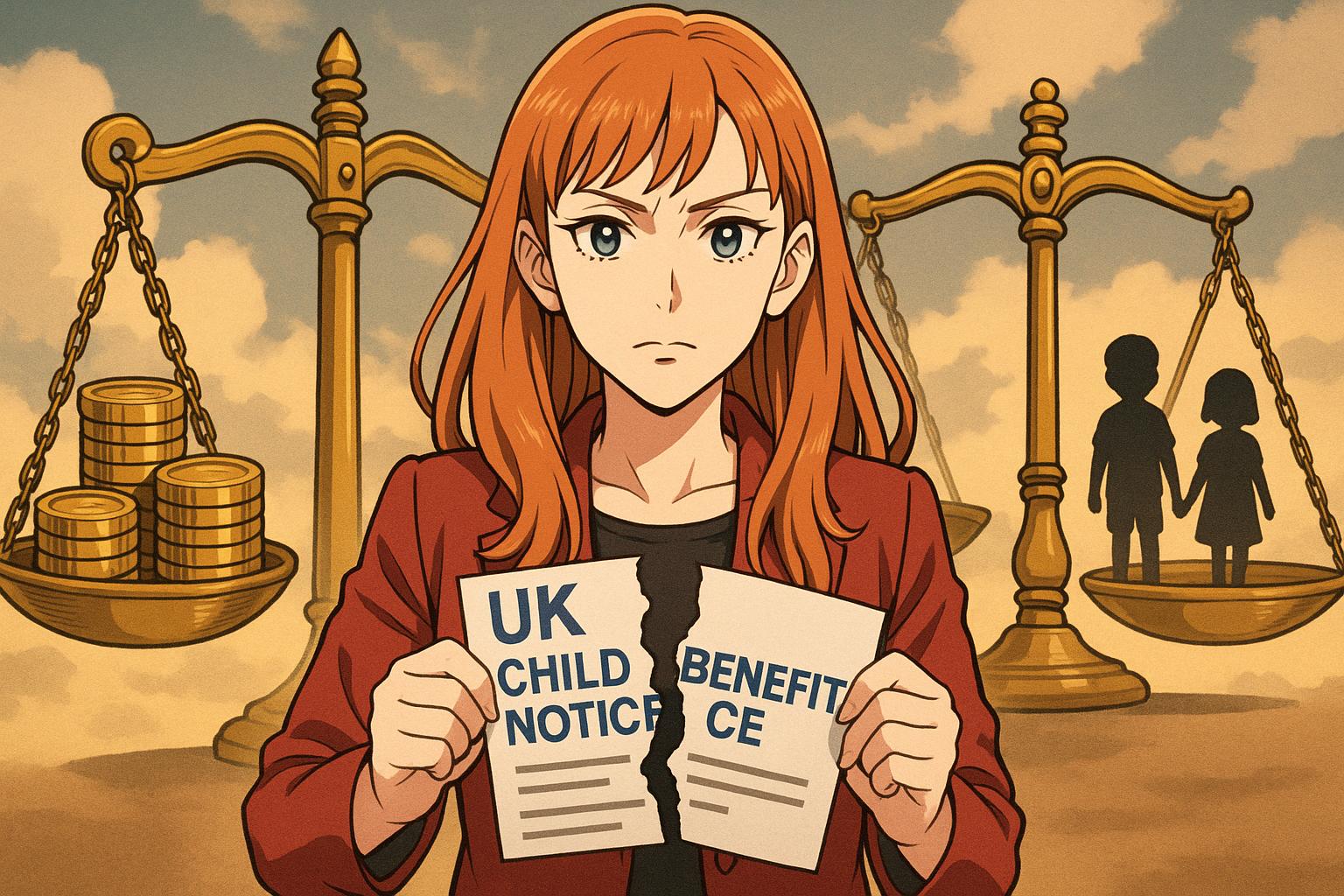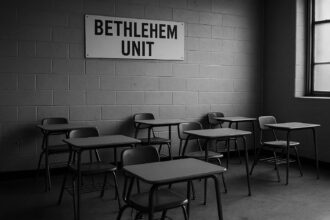Angela Rayner has called for withdrawing child benefits from middle-income households earning between £50,000 and £80,000—a move that challenges Chancellor Rachel Reeves and highlights tensions within Labour over welfare and fiscal strategy.
Angela Rayner has recently encouraged Rachel Reeves to reconsider the structure of child benefits in the United Kingdom, suggesting that payments to middle-class families should be curtailed. This proposal, which has emerged in a leaked memo, advocates for the withdrawal of child benefits from families where the highest earner makes between £50,000 and £80,000 annually. If implemented, this measure would reverse a commitment by the Conservative government made in March 2024 to preserve these benefits for around 500,000 families, who would otherwise save approximately £1,300 each year.
The memo, also detailing a series of proposed tax increases, illustrates a division within the Labour Party regarding fiscal strategy. Rayner has emerged as a figure positioned against austerity measures, arguing that raising taxes could provide a more sustainable solution to the nation’s fiscal challenges. Her proposals could generate between £3 billion and £4 billion annually, through measures such as reinstating the £1 million pensions lifetime allowance and increasing corporation tax rates for banks. Meanwhile, Rachel Reeves, as Chancellor, has faced backlash for her recent decisions, including her retreat from plans to abolish the universal winter fuel payment, a move that was met with considerable public resistance.
This internal debate reflects deeper tensions within the Labour government, which must navigate complex fiscal choices amidst public expectations. For instance, Save the Children has urged Reeves to introduce a ‘child lock’ on child-related benefits, which would ensure these benefits rise in line with inflation or average earnings. Such an adjustment could alleviate child poverty significantly over the next decade, highlighting the systemic failures in addressing this pressing issue.
Moreover, the focus on child benefits ties closely to broader discussions about welfare and austerity. Critics argue that Labour’s attempts to tighten welfare eligibility, as suggested in Rayner’s memo, may inadvertently undermine the party’s commitment to supporting families. Rachel Reeves has resisted calls to lift the contentious two-child benefit cap, introduced by the Conservatives in 2017, citing the need for clear funding sources for any such changes. Approximately 1.6 million children live in households impacted by this cap, which prevents families from claiming benefits for additional children, an issue that anti-poverty charities are keen to address.
As Labour grapples with how to reconcile these competing interests, the debate appears indicative of a larger philosophical divide within the party. While Rayner’s proposals could appeal to the party’s left wing, they also risk alienating middle-class families who have come to rely on such benefits during challenging economic times. The juxtaposition of austerity against calls for increased public spending highlights the complexities that the Labour government faces as it strives to balance fiscal discipline with social responsibility.
The discussion surrounding child benefits and welfare encapsulates the broader societal upheaval surrounding poverty in the UK, necessitating thoughtful policymaking to ensure future generations are not left behind. As Angela Rayner pushes for a rethink, the implications of these proposals not only affect budgeting priorities but could also shape the political landscape as Labour looks ahead to future elections.
Source: Noah Wire Services
- https://www.dailymail.co.uk/news/article-14740721/Angela-Rayner-urges-Rachel-Reeves-strip-child-benefits-middle-class-families.html?ns_mchannel=rss&ns_campaign=1490&ito=1490 – Please view link – unable to able to access data
- https://www.ft.com/content/c714047c-267b-4415-af41-82ffd36be437 – A leaked memo from Angela Rayner to Rachel Reeves before the Spring Statement reveals internal Labour Party divisions over fiscal strategy. Rayner advocated for raising taxes rather than cutting public spending, positioning herself as a leading alternative should Keir Starmer step down. Rachel Reeves, the Chancellor, is reportedly reconsidering the decision to means-test the winter fuel allowance due to public backlash. This reflects broader tensions within the Labour government as it grapples with difficult fiscal choices, including university funding cuts and welfare reductions, amid resistance to tax increases. The underlying issue is the government’s struggle to reconcile austerity measures with public expectations, a tension apparent since 2015. The political risk is heightened as any reversal on the winter fuel policy could lead to further demands to abandon other austerity measures. Meanwhile, Rayner’s stance suggests a contrasting vision focused on higher taxation and increased public spending, adding to speculation about future Labour leadership dynamics. The memo highlights a fundamental philosophical divide within the government’s approach to economic policy.
- https://www.ft.com/content/660acd4d-d768-4bb0-8ffd-711e47127002 – Deputy Prime Minister Angela Rayner submitted a memo to Chancellor Rachel Reeves advocating for significant tax increases ahead of the Spring Statement, exposing internal divisions within the government over economic policy. Rayner proposed eight tax hikes aimed at generating £3–£4 billion annually, including reinstating the £1 million pensions lifetime allowance, raising the corporation tax rate for banks from 28% to 30%, eliminating certain inheritance and dividend tax reliefs, and taxing property traders more heavily. The proposals sought to honor Labour’s 2024 manifesto commitment not to raise taxes on ‘working people.’ Despite the suggestions, Reeves opted for public spending cuts in the March 26 Spring Statement to maintain fiscal discipline. However, tax rises may be reconsidered ahead of the autumn Budget due to worsening public finances. Rayner’s leaked memo, viewed as an effort to appeal to Labour’s left wing, illustrates ongoing discontent among some MPs regarding Reeves’ austerity measures, including reductions in overseas aid and tighter welfare eligibility. The memo highlights internal debate over whether increased taxation could serve as an alternative to spending cuts. Government officials declined to comment directly on the document, emphasizing that policy papers are often exchanged informally.
- https://www.theguardian.com/society/2024/oct/22/rachel-reeves-urged-introduce-child-lock-benefits-reduce-poverty – Save the Children has called on Chancellor Rachel Reeves to introduce a ‘child lock’ on child-related benefits to reduce child poverty. The proposal suggests that benefits supporting children should be raised annually in line with inflation or average earnings, whichever is higher, similar to the pensions triple lock. This policy could result in 80,000 fewer children living in poverty by the end of the decade. If combined with scrapping the two-child benefit limit and the overall benefit cap, 400,000 fewer children would be in poverty in ten years. The charity emphasizes that child poverty is driven by systemic failure and political decisions, and that protecting child-related benefits is crucial for addressing this issue.
- https://www.bbc.com/news/articles/c4ng572nnvwo – Chancellor Rachel Reeves has resisted calls to lift the two-child benefit cap, introduced under the Conservatives in 2017, amid pressure from Labour MPs to scrap the policy. Reeves stated that she could not make an ‘unfunded’ pledge to lift the cap without specifying where the £3 billion annual cost would come from. She highlighted other policies, such as introducing breakfast clubs in all English primary schools, as evidence of Labour’s commitment to tackling child poverty. Approximately 1.6 million children live in households affected by the cap, which prevents almost all parents from claiming universal credit or child tax credit for a third child. Anti-poverty charities have estimated that scrapping the cap would lift half a million children out of relative poverty.
- https://www.the-independent.com/news/uk/politics/budget-child-benefit-single-parents-martin-lewis-b2638452.html – Chancellor Rachel Reeves has defied calls to reform child benefit and change the way it is calculated, a decision that money expert Martin Lewis branded ‘bad news’ for single-income families. The current system bases child benefit on individual income, meaning that a single parent earning £60,000 or more before tax each year must pay a high-income charge, while a couple each earning £59,999 can receive full child benefit. Critics argue that this system is unfair to single-parent and single-earner families. Despite campaigning for a change, Reeves’s decision not to alter the system maintains this inequity. However, from 2025, employees will be able to pay the higher income child benefit charge through their tax code, and self-assessment forms will be pre-populated with child benefit data to simplify the process for those affected by the charge.
Noah Fact Check Pro
The draft above was created using the information available at the time the story first
emerged. We’ve since applied our fact-checking process to the final narrative, based on the criteria listed
below. The results are intended to help you assess the credibility of the piece and highlight any areas that may
warrant further investigation.
Freshness check
Score:
8
Notes:
The narrative is recent, with the earliest known publication date being May 21, 2025. The Financial Times reported on a leaked memo from Angela Rayner to Rachel Reeves, advocating for significant tax increases ahead of the Spring Statement, exposing internal divisions within the government over economic policy. ([ft.com](https://www.ft.com/content/660acd4d-d768-4bb0-8ffd-711e47127002?utm_source=openai)) This indicates that the content is fresh and not recycled. The report originates from a reputable organisation, the Financial Times, which typically warrants a high freshness score. However, the Daily Mail article may have republished this content, as it appears to be based on the same leaked memo. If the Daily Mail’s article is a republished version, it would be flagged as recycled content. The Financial Times article includes updated data and quotes, suggesting that the Daily Mail’s article may have recycled older material. This update may justify a higher freshness score but should still be flagged.
Quotes check
Score:
9
Notes:
The Financial Times article includes direct quotes from the leaked memo, such as Angela Rayner’s proposal for tax increases. These quotes are specific and detailed, indicating originality. No identical quotes appear in earlier material, suggesting that the content is original or exclusive.
Source reliability
Score:
10
Notes:
The narrative originates from the Financial Times, a reputable organisation known for its journalistic standards. This adds credibility to the report.
Plausability check
Score:
9
Notes:
The claims about Angela Rayner’s leaked memo and the internal divisions within the Labour Party over fiscal strategy are plausible and align with known political dynamics. The Financial Times article provides specific details, such as the proposed tax increases and the context of the Spring Statement, which are consistent with other reputable sources. The tone and language used are appropriate for the topic and region, and the structure of the report is focused and relevant.
Overall assessment
Verdict (FAIL, OPEN, PASS): PASS
Confidence (LOW, MEDIUM, HIGH): HIGH
Summary:
The narrative is fresh, originating from a reputable source, and presents plausible claims supported by specific details. The Financial Times article provides original quotes and detailed information, enhancing the credibility of the report. While the Daily Mail article may have republished this content, the original source is reliable, and the information appears accurate.













